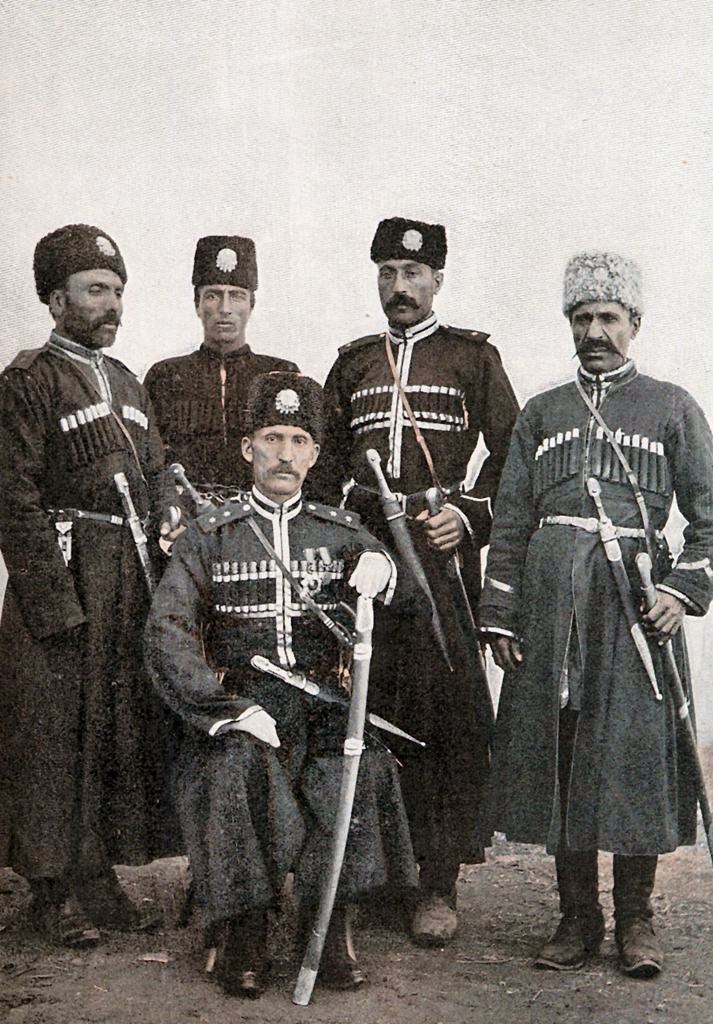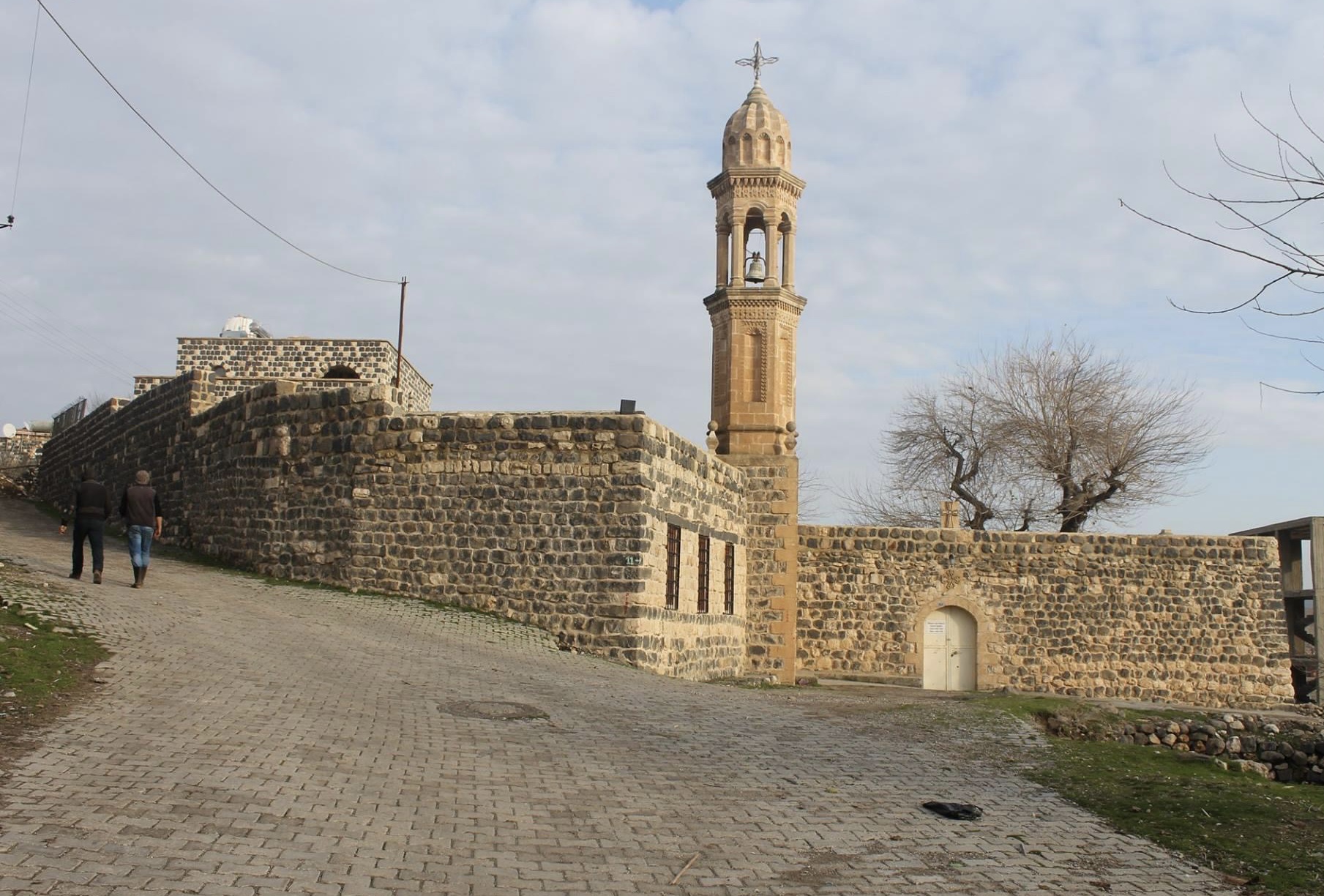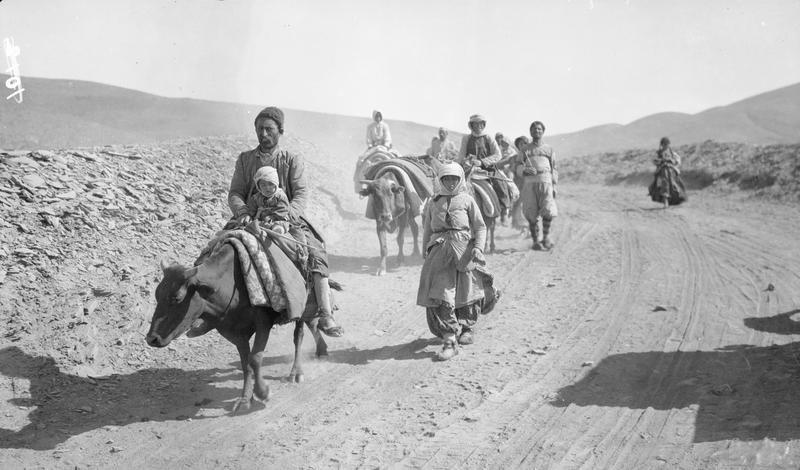|
ГңГ§ok, Д°dil
ГңГ§ok (; ) is a village in the Д°dil District of ЕһДұrnak Province in Turkey. The village is populated by Kurds of the Hesinan tribe and had a population of 519 in 2021. History Babeqqa (today called ГңГ§ok) was historically inhabited by Syriac Orthodox Christians. In the Syriac Orthodox patriarchal register of dues of 1870, it was recorded that the village had thirteen households, who paid twenty-four dues, and it did not have a church or a priest. Babeqqa was attacked by Hamidiye horsemen led by Mustapha Pasha on 20 December 1901 and five men from the village were killed, seven were wounded, and all of their flocks were stolen. Some people from Azakh who decided to help the people of Babeqqa were consequently ambushed by the Hamidiye en route to the village and a skirmish resulted in the death of eleven men from Azakh and seven injured whilst two Kurds were killed and two were wounded. Amidst the Sayfo The Sayfo (, ), also known as the Seyfo or the Assyrian genocide, ... [...More Info...] [...Related Items...] OR: [Wikipedia] [Google] [Baidu] |
Д°dil District
Д°dil District is a district of the ЕһДұrnak Province of Turkey. The seat of the district is the town of Д°dil and the population was 77,105 in 2021. Its area is 1,148 km2. The district was formed in 1937. The western part of the district is considered part of the Tur Abdin region, while the eastern part is considered part of the Bohtan region. Settlements Д°dil District contains three beldes, sixty-five villages, of which three are unpopulated, and nineteen hamlets A hamlet is a human settlement that is smaller than a town or village. This is often simply an informal description of a smaller settlement or possibly a subdivision or satellite entity to a larger settlement. Sometimes a hamlet is defined f .... Beldes # Д°dil # Karalar () # SДұrtkГ¶y () Villages # AГ§ma () # AkdaДҹ () # Akkoyunlu () # Aksoy () # AlakamДұЕҹ () # BaЕҹakkГ¶y () # Bereketli () # Bozburun () # BozkДұr () # ГҮДұДҹДұr () # ГҮДұnarlДұ () # ГҮukurlu () # Dirsekli ( ... [...More Info...] [...Related Items...] OR: [Wikipedia] [Google] [Baidu] |
ЕһДұrnak Province
ЕһДұrnak Province (, ) is a Provinces of Turkey, province in Turkey in the Southeastern Anatolia Region. ЕһДұrnak Province was created in 1990, with areas that were formerly part of the Siirt Province, Siirt, HakkГўri Province, HakkГўri and Mardin Provinces. It borders both Kurdistan Region of Iraq and Syria. The current WДҒli, Governor of the province is Cevdet Atay. The province had a population of 570,745 in 2023. Its area is 7,078 km2. It encompasses 19 Belde, municipalities, 240 villages and 192 Hamlet (place), hamlets. Considered part of Turkish Kurdistan, the province has a Kurds, Kurdish majority. Geography ЕһДұrnak Province has some mountainous regions in the west and the south, but the majority of the province consists of plateaus, resulting from the many rivers that cross it. These include the Tigris (and its tributaries Hezil and KДұzДұlsu) and ГҮaДҹlayan (river), ГҮaДҹlayan. The most important mountains are Mount Cudi (2089 m), Mount Gabar, Mount Namaz and Moun ... [...More Info...] [...Related Items...] OR: [Wikipedia] [Google] [Baidu] |
Turkey
Turkey, officially the Republic of TГјrkiye, is a country mainly located in Anatolia in West Asia, with a relatively small part called East Thrace in Southeast Europe. It borders the Black Sea to the north; Georgia (country), Georgia, Armenia, Azerbaijan, and Iran to the east; Iraq, Syria, and the Mediterranean Sea to the south; and the Aegean Sea, Greece, and Bulgaria to the west. Turkey is home to over 85 million people; most are ethnic Turkish people, Turks, while ethnic Kurds in Turkey, Kurds are the Minorities in Turkey, largest ethnic minority. Officially Secularism in Turkey, a secular state, Turkey has Islam in Turkey, a Muslim-majority population. Ankara is Turkey's capital and second-largest city. Istanbul is its largest city and economic center. Other major cities include Д°zmir, Bursa, and Antalya. First inhabited by modern humans during the Late Paleolithic, present-day Turkey was home to List of ancient peoples of Anatolia, various ancient peoples. The Hattians ... [...More Info...] [...Related Items...] OR: [Wikipedia] [Google] [Baidu] |
Kurds
Kurds (), or the Kurdish people, are an Iranian peoples, Iranic ethnic group from West Asia. They are indigenous to Kurdistan, which is a geographic region spanning southeastern Turkey, northwestern Iran, northern Iraq, and northeastern Syria. Consisting of 30вҖ“45 million people, the global Kurdish population is largely concentrated in Kurdistan, but significant communities of the Kurdish diaspora exist in parts of West Asia beyond Kurdistan and in parts of Europe, most notably including: Turkey's Central Anatolian Kurds, as well as Kurds in Istanbul, Istanbul Kurds; Iran's Khorasani Kurds; the Caucasian Kurds, primarily in Kurds in Azerbaijan, Azerbaijan and Kurds in Armenia, Armenia; and the Kurdish populations in various European countries, namely Kurds in Germany, Germany, Kurds in France, France, Kurds in Sweden, Sweden, and the Kurds in the Netherlands, Netherlands. The Kurdish language, Kurdish languages and the ZazaвҖ“Gorani languages, both of which belong to the Wes ... [...More Info...] [...Related Items...] OR: [Wikipedia] [Google] [Baidu] |
Kurdish Tribes
Kurdish tribes are tribes of Kurds, Kurdish people, an ethnic group from the geo-cultural region of Kurdistan in West Asia, Western Asia. The tribes are socio-political and generally also a territorial unit based on descent and kinship, real or putative, with a characteristic internal structure. They are naturally divided into a number of sub-tribes, and each of these sub-tribes again are divided into smaller units: clans, lineages and households. Designation Each Kurdish tribe use different kinds of terms to designate "Tribe", "sub-tribe", "Clan", "lineage" and "household"; 'Ahiret, Tira, Hoz, il, Khel, Tayfa or Taifa, Zuma and Rama. These terms are used loosely and interchangeably despite the tribal structure and organization of all Kurdish tribes are almost the same. History Early record In the 9th century, it was reported by Ibn Khordadbeh, Ibn khurdubah that Kurdish tribes used the word ZЕ«ma to designate tribes (, ; ). The 9th century historian, Ya'qubi, recorded present ... [...More Info...] [...Related Items...] OR: [Wikipedia] [Google] [Baidu] |
Syriac Orthodox Church
The Syriac Orthodox Church (), also informally known as the Jacobite Church, is an Oriental Orthodox Christian denomination, denomination that originates from the Church of Antioch. The church currently has around 4-5 million followers. The church upholds the Miaphysitism, Miaphysite doctrine in Christology and employs the Liturgy of Saint James, associated with James, brother of Jesus, James the Just. Classical Syriac is the official and liturgical language of the church. The supreme head of the Syriac Orthodox Church is the patriarch of Antioch, a bishop who, according to sacred tradition, continues the leadership passed down from Saint Peter. Since 2014, Ignatius Aphrem II has served as the Syriac Orthodox Patriarch of Antioch and All the East, Syriac Orthodox Antiochian patriarch. The Domus Aurea (Antioch), Great Church of Antioch was the patriarchal seat and the headquarters of the church until , after which Severus of Antioch had to flee to Alexandria, Egypt. After the de ... [...More Info...] [...Related Items...] OR: [Wikipedia] [Google] [Baidu] |
Hamidiye (cavalry)
The ''Hamidiye'' regiments (literally meaning "belonging to Hamid", full official name ''Hamidiye Hafif SГјvari AlaylarДұ'', Hamidiye Light Cavalry Regiments) were well-armed, irregular, mainly Sunni Kurdish but also Turkish, Circassian,Palmer, Alan, ''Verfall und Untergang des Osmanischen Reiches'', Heyne, MГјnchen 1994 (engl. Original: London 1992), pp. 249, 258, 389. .Van Bruinessen, Martin''Agha, Shaikh and State - The Social and Political Structures of Kurdistan'' London: Zed Books, 1992, p. 185. Van Bruinessen mentions the "occasional" recruiting of a Turkish tribe (the Qarapapakh) Turkmen, Shaw, Stanford J. and Ezel Kural Shaw, ''History of the Ottoman Empire and Modern Turkey''. Cambridge: Cambridge University Press, 1977, vol. 2, p. 246. YГ¶rГјk,Г–hrig, Bruno, ''Meinungen und Materialien zur Geschichte der KarakeГ§ili Anatoliens'', in: Matthias S. Laubscher (Ed.), MГјnchener Ethnologische Abhandlungen, 20, Akademischer Verlag, MГјnchen 1998 (Edition Anacon), zuglei ... [...More Info...] [...Related Items...] OR: [Wikipedia] [Google] [Baidu] |
Д°dil
Д°dil (, or ''Beth Zabday'', , ) is a city and seat of the Д°dil District of the ЕһДұrnak Province in Turkey. It is located in the historical region of Tur Abdin. The town had a population of 30,271 in 2021 and is composed of Kurds of the Domanan, Dorikan, Harunan, Meman and Omerkan tribes. The town was once home to a large number of Assyrians/Syriacs, however, only a few families remain today. In the city, there is a Syriac Orthodox Church of the Mother of God (, ). History Azakh (today called Д°dil) is identified as the town of Ashikhu, or Asiбё«u, which is earliest attested in an administrative note from the governor's archive at Tell Halaf, during the reign of Adad-nirari III, King of Assyria, in the late 9th and early 8th century BC. Azakh was later conflated with the neighbouring city of Bezabde, and led to its alternative Syriac name Beth Zabday. Ottoman Empire Muhammad Pasha, Emir of Rawandiz, took advantage of the disruption caused to the Ottoman Empire by the E ... [...More Info...] [...Related Items...] OR: [Wikipedia] [Google] [Baidu] |
Sayfo
The Sayfo (, ), also known as the Seyfo or the Assyrian genocide, was the mass murder and deportation of Assyrian people, Assyrian/Syriac Christians in southeastern Anatolia and Persia's Azerbaijan (Iran), Azerbaijan province by Ottoman Army (1861вҖ“1922), Ottoman forces and some Kurdish tribes during World War I. The Assyrians were divided into mutually antagonistic churches, including the Syriac Orthodox Church, the Assyrian Church of the East, and the Chaldean Catholic Church. Before World War I, they largely lived in mountainous and remote areas of the Ottoman Empire and Persia, some of which were effectively Stateless society, stateless. The Ottoman Empire's nineteenth-century centralization efforts led to increased violence and danger for the Assyrians. Mass killing of Assyrian civilians began during the Persian campaign (World War I), Ottoman occupation of Azerbaijan from January to May 1915, during which massacres were committed by Ottoman forces and pro-Ottoman Kur ... [...More Info...] [...Related Items...] OR: [Wikipedia] [Google] [Baidu] |
Assyrian People
Assyrians (, ) are an ethnic group Indigenous peoples, indigenous to Mesopotamia, a geographical region in West Asia. Modern Assyrians Assyrian continuity, share descent directly from the ancient Assyrians, one of the key civilizations of Mesopotamia. While they are distinct from other Mesopotamian groups, such as the Babylonians, they share in the broader cultural heritage of the Mesopotamian region. Modern Assyrians may culturally self-identify as Terms for Syriac Christians#Syriac identity, Syriacs, Chaldean Catholics, Chaldeans, or Terms for Syriac Christians#Aramean identity, Arameans for religious, geographic, and tribal identification. Assyrians speak various dialects of Neo-Aramaic, specifically those known as Suret and Turoyo, which are among the oldest continuously spoken and written languages in the world. Aramaic was the lingua franca of West Asia for centuries and was the language spoken by historical Jesus, Jesus. It has influenced other languages such as Hebrew an ... [...More Info...] [...Related Items...] OR: [Wikipedia] [Google] [Baidu] |
Villages In Д°dil District
A village is a human settlement or community, larger than a hamlet but smaller than a town with a population typically ranging from a few hundred to a few thousand. Although villages are often located in rural areas, the term urban village is also applied to certain urban neighborhoods. Villages are normally permanent, with fixed dwellings; however, transient villages can occur. Further, the dwellings of a village are fairly close to one another, not scattered broadly over the landscape, as a dispersed settlement. In the past, villages were a usual form of community for societies that practice subsistence agriculture and also for some non-agricultural societies. In Great Britain, a hamlet earned the right to be called a village when it built a church.-4; we might wonder whether there's a point at which it's appropriate to talk of the beginnings of French, that is, when it wa ... ''village'', from Latin ''villДҒticus'', ultimately from Latin ''villa'' (English ''villa''). Ce ... [...More Info...] [...Related Items...] OR: [Wikipedia] [Google] [Baidu] |
Kurdish Settlements In ЕһДұrnak Province
Kurdish may refer to: *Kurds or Kurdish people *Kurdish language **Northern Kurdish (Kurmanji) **Central Kurdish (Sorani) **Southern Kurdish ** Laki Kurdish *Kurdish alphabets *Kurdistan, the land of the Kurdish people which includes: **Southern Kurdistan **Eastern Kurdistan **Northern Kurdistan **Western Kurdistan See also * Kurd (other) *Kurdish literature *Kurdish music *Kurdish rugs *Kurdish cuisine *Kurdish culture *Kurdish nationalism Kurdish nationalism () is a nationalist political movement which asserts that Kurds are a nation and espouses the creation of an independent Kurdistan from Iran, Iraq, Syria, and Turkey. Early Kurdish nationalism had its roots in the Ottoman ... {{disambiguation Language and nationality disambiguation pages ... [...More Info...] [...Related Items...] OR: [Wikipedia] [Google] [Baidu] |






